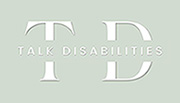Something short and sweet for you this week, a thought for the day, if you will.
As a visually impaired person, I like to think I know all there is to know about living with a disability, which just goes to show that arrogance is a sin and there is always room to learn. I’ve been introduced to two terms recently; the medical model and the social model, both of which are related to disabilities.
The medical model is simple enough to understand. It describes the disability itself – visual impairment, hearing impairment, autism etc. These might be the definitions the government would use and would consider perhaps when deciding if somebody’s claim for benefits is acceptable.
The social model refers to someone’s environment. So for example a hearing impaired person might benefit from having a quiet space to work and someone who is visually impaired or using a wheelchair would require their environment to be as free of clutter as possible in order for them to move about safely.
But I don’t think this definition goes far enough. It doesn’t take into account whether or not people even consider themselves to be disabled. What may seem like insurmountable obstacles or challenges to someone, is just everyday life for somebody else. We regard disabilities as a misfortune and I’m just as guilty of that as anyone else.
While working on a YouTube video recently, I was describing different types of disabilities and I came to sensory disabilities, which are hearing and visual impairments. I made the mistake of saying something like, ‘and if you’re very unfortunate you’ll have both.’ I wince now just thinking about it. All I meant was that two disabilities means double the challenges, but I’m not sure it would have come across that way.
For someone who has lived with a disability all their life, it is the norm. They have found ways to adapt. I don’t consider myself to be particularly unfortunate even though I have a visual impairment. I encounter a lot of frustrations but most of them are down to the attitude of society and could be easily resolved.
So if you do ever consider hiring someone and their particular needs seem absolutely impossible to overcome, just remember that what to you is the equivalent of climbing Mount Everest backwards with a blindfold, to somebody else is just a minor hurdle to be got around. If para Olympians can compete in international sports with limbs missing and bring home gold medals for their countries, you can make minor adaptations and adjustments to your workplace, no problem.
